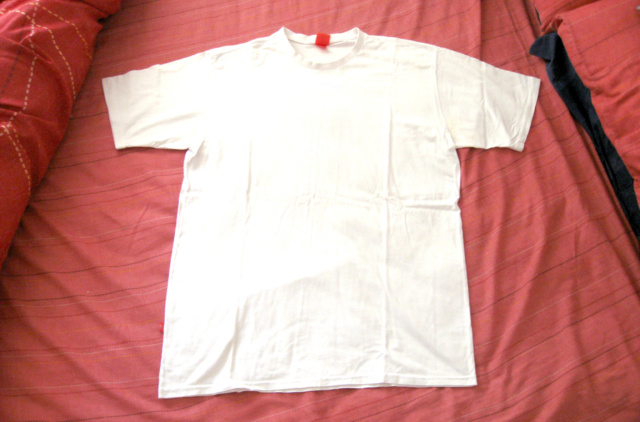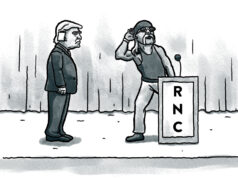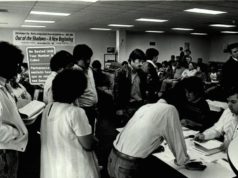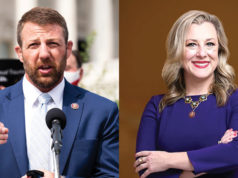
The Trans-Pacific Partnership is dead. But who cares, right? It’s just some corporate free-trade giveaway meant to screw poor people in Vietnam and make them work 25-hour days right next to their kids on the T-shirt assembly line. We’re all the better without it, right? Now we can make those T-shirts right here, in America!
Wrong.
Pour out a beer – a good ol’ American beer – for TPP. The loss of the Trans-Pacific Partnership is a loss for America and a win for China. Here’s why.
Of cloth and wine: Comparative advantage
People within states and countries trade goods and services with one another. Some countries are better at making some things than others, the classic example being that England was better at making cloth than at making wine. On the other hand, Portugal — where that nectar of the gods, port, comes from — is very good at making wine but not as good as England at making cloth.
So, as the English economist David Ricardo observed in the early 1800s, it makes more sense for countries to trade the things they make well for things that other states make well, hence the name: comparative advantage. England got better wine (and who would ever imagine that English wine would be very good to begin with?) and Portugal got cheaper cloth. Both sides had more labor to use making their cloth or wine, so they both benefited.
That rule is more or less the same today as it was then, except the products are different. In America, we make things at the top of the pile: airplanes, wind turbines, solar panels. These are not things competitors can quickly copy and make right away. They take expertise and innovation. They are products that take years to develop. China or Mexico can’t just get some guys in a room and give them aluminum foil and tell them to make a 747.
As a result, America needs to ask why it should spend time making T-shirts and socks. We should be training our unemployed former textile workers to program, and we should be helping them get jobs in new industries. The jobs of the past are not coming back, regardless of the Trans-Pacific Partnership.
Trade itself is not necessarily the problem here. Sure, when an auto factory in Flint, Michigan, closes and moves to Nogales, Mexico, people are going to hurt. There’s no denying that. But to blame trade for a supposed “decline” in American manufacturing is false.
The reason America has fewer manufacturing jobs is simple: We’ve gotten better at making stuff. Long gone are the days of thousands of men standing shoulder to shoulder in a Ford factory making Model Ts. Now we have robots who paint and weld, plus machines that help auto workers put cars together. The next great middle-class job isn’t the auto assembly line employee who works in the GM plant for 40 years and retires. It’s the computer programmer who helps make the robots that build the cars.
New standards would have been game changers
With one trade deal, the United States was about to lock East Asia, Australia and New Zealand into an agreement that would ensure U.S. dominance in the region for decades to come. By setting standards for environmental protection, labor rights and fair play, we were about to set the highest standard for a trade agreement (outside of Europe) in all of history.
Vietnamese workers, for example, were about to enjoy the benefits of a regulated 10-hour working day, plus health and safety protections they have never had. Unions, unheard of in Vietnam, were about to be given the right to organize freely and bargain collectively for the rights of workers. These things have never been in any trade agreement.
Environmental campaigners in Peru, Chile and, yes, Vietnam were about to realize major advances in protections, as TPP included provisions that, unlike every other previous trade agreement, bound participants in TPP to strict rules to protect ocean fisheries from overfishing and pollution. TPP would have served as a means to cut down on the illegal trade in wildlife products, or cut down on the illegal logging of rainforests. It was enough to get the World Wildlife Fund to give it a thumbs up in 2015. Was TPP enough in and of itself? No, of course not. But it was a start, and it was many steps ahead of where we stand now.
So what do workers’ rights in Vietnam or environmental protections in Chile have to do with America’s place in the world?
Simple: China wasn’t a part of this deal. There’s no way they would have agreed to environmental protection or labor standards. But no doubt would China have wanted into this deal, and badly so. They want to trade with everyone. They want to make our T-shirts and knickknacks. So why not let them join on the condition that they raise their standards?
To have joined TPP would have meant the single greatest improvement in their working standards ever. But for us, it would have locked China into our rules, on our terms. It would have made China rise to our level, not the lowest common denominator.
TPP was the finishing touch, the cherry on top, of former President Barack Obama’s pivot to Asia, a pivot designed to help secure our leadership and rise to the challenges of an aggressive China, just as the 20th century saw us rise to the challenges of Nazism and Soviet totalitarianism — and defeat them both.
Will we ever be forgiven?
The time is exactly right for America to enact game-changing trade policies. The countries in East Asia are turning to us for leadership and, yes, for protection. They want to trust us, like Germany did, as a reliable and stable partner for trade and security. Even Vietnam, formerly our enemy, now seeks to become our friend.
They want to help us make the 21st century the second American Century. It is in their interest to help us and in our interest to take their help. Instead, we are too busy making America “great” again while losing “bigly” in the process.
If President Donald Trump thinks he can pull a “Carrier” any time he needs to, get that quick hit of sugar by “saving” 300 jobs here, 400 jobs there, he might eventually save a couple thousand jobs. But this won’t make any difference in the long term. It will generate some publicity, and no doubt he’ll enjoy that. He can even send some great tweets from the photo-op, too. But like all sugary treats, it will burn off pretty quickly, leaving him wanting some more while the nation receives no real economic or nutritional benefits in the long run. I suspect this is an analogy that will serve us all well for the next four years or so.
So the next time you buy a T-shirt at Target, take a look at the label. There’s a good chance it came from somewhere that would have been a part of the Trans-Pacific Partnership.
As you’re looking at that tag, please think about the Vietnamese garment worker who would have benefited from a shorter working day and from being able to unionize. Consider the family who could have fed their children better, worked in better conditions and enjoyed more health and safety protections.
I hope they’ll forgive us. We just got so busy making America great again.





















